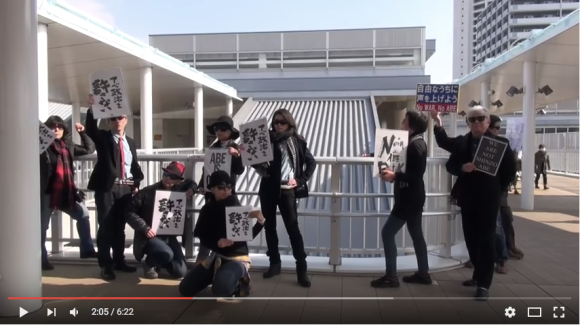
Is a flash mob protected free speech? The Japanese courts will decide.
A flash mob, according to Wikipedia, is a group of people who assemble suddenly in a public place, perform an unusual and seemingly pointless act for a brief time, then quickly disperse, often for the purposes of entertainment, satire, and artistic expression. Even if you’ve never seen one in person, you’ve probably watched a viral video of one, like this oddity from New York performance group Improv Everywhere.
Given the performative nature of flash mobs, they often take place in public areas. And given the importance of the element of surprise, organizers rarely if ever apply for permits in advance, as would be required for a political rally, for example. So what happens when your flash mob has a political message? Are you breaking the law? A Japanese court is being asked to decided that question.
This all started back in February, when a group called Mothers’ Action for Peace and Democracy organized a flash mob outside of Ebina Station in Kanagawa. About 10 similarly dressed participants moved around the elevated walkways surrounding the station, holding signs protesting Prime Minister Shinzo Abe. For a few minutes at a time, they would strike mannequin-like poses and then move on to another location. This went on for about an hour.
The following month, Ebina mayor Masaru Uchino, an independent, issued an interdiction against similar “performances” on the grounds that they violated city ordinances banning gatherings and demonstrations on the public walkways. It set a fine of 5000 yen (about US$48) for violations.
In response, a collection of city councilpeople and members of the group filed a lawsuit at the Yokohama District Court this week, claiming that the city was infringing on their right to free speech. They say that the modest size of the flash mob means it does not fit the definition of a gathering or demonstration and that it did not impede pedestrian traffic. According to Japan’s Road Traffic Act, says the group’s lawyer, if a gathering does not significantly impede traffic, it must be allowed.
Reactions to the case on social media are mixed.
“This isn’t freedom of expression, it’s an anti-government demonstration, so of course they have a right to regulate it.”
“Repealing these traffic regulations would cause trouble for us all. I wish they would stop.”
“Good luck, flash mobbers! If we give up here, they will snatch away more of our rights to gather and express ourselves!”
“If you have a political intent, gather some people and appeal to the public, it’s always going to be seen as a demonstration.”
So now it’s up to the courts to decide what exactly constitutes a flash mob and whether it is protected free speech.
What say you, Rocketeers?
Sources: Naver Matome, Gadget Tsuushin, Asahi Shinbun
Top photo: YouTube/Sakae Ishikawa

 Flash mob performing Totoro theme song will melt your heart, make you want to join in
Flash mob performing Totoro theme song will melt your heart, make you want to join in Flash mob at Manila airport brings holiday cheer to surprised passengers
Flash mob at Manila airport brings holiday cheer to surprised passengers Japanese man proposes to girlfriend with huge flash mob in a shopping mall 【Video】
Japanese man proposes to girlfriend with huge flash mob in a shopping mall 【Video】 The Philippines Bureau of Immigration is so “Happy” to see you, they’re flash-mobbing
The Philippines Bureau of Immigration is so “Happy” to see you, they’re flash-mobbing Japan Self-Defense Force members breakdance while performing Hatsune Miku song
Japan Self-Defense Force members breakdance while performing Hatsune Miku song Yakuzen ramen restaurant in Tokyo is very different to a yakuza ramen restaurant
Yakuzen ramen restaurant in Tokyo is very different to a yakuza ramen restaurant Tokyo Skytree turns pink for the cherry blossom season
Tokyo Skytree turns pink for the cherry blossom season Tokyo Station staff share their top 10 favorite ekiben
Tokyo Station staff share their top 10 favorite ekiben 566 million yen in gold bars donated to Japanese city’s water bureau
566 million yen in gold bars donated to Japanese city’s water bureau Here comes Japan’s newest fruit dessert sandwich: 7-Eleven’s purple Blueberry Sandwich!
Here comes Japan’s newest fruit dessert sandwich: 7-Eleven’s purple Blueberry Sandwich! New zombie ship sets sail in Japan, includes Shinkansen tickets and all-you-can-eat sushi
New zombie ship sets sail in Japan, includes Shinkansen tickets and all-you-can-eat sushi Surprise! Terrifying new retro Godzilla movie, Godzilla -1.0, coming to Japan and U.S. this year【Video】
Surprise! Terrifying new retro Godzilla movie, Godzilla -1.0, coming to Japan and U.S. this year【Video】 Japan’s bathhouse-themed bar replaces hot water with unlimited alcohol
Japan’s bathhouse-themed bar replaces hot water with unlimited alcohol Princesses, fruits, and blacksmiths: Study reveals the 30 most unusual family names in Japan
Princesses, fruits, and blacksmiths: Study reveals the 30 most unusual family names in Japan Japan’s official Hello Kitty Airport holds ribbon-cutting ceremony, now welcoming travelers【Pics】
Japan’s official Hello Kitty Airport holds ribbon-cutting ceremony, now welcoming travelers【Pics】 The 10 most annoying things foreign tourists do on Japanese trains, according to locals
The 10 most annoying things foreign tourists do on Japanese trains, according to locals Starbucks Japan releases new sakura goods and drinkware for cherry blossom season 2026
Starbucks Japan releases new sakura goods and drinkware for cherry blossom season 2026 Naruto and Converse team up for new line of shinobi sneakers[Photos]
Naruto and Converse team up for new line of shinobi sneakers[Photos] Is Sapporio’s Snow Festival awesome enough to be worth visiting even if you hate the snow? [Pics]
Is Sapporio’s Snow Festival awesome enough to be worth visiting even if you hate the snow? [Pics] Japan has trams that say “sorry” while they ride around town…but why?
Japan has trams that say “sorry” while they ride around town…but why? Sakura Totoro is here to get spring started early with adorable pouches and plushies
Sakura Totoro is here to get spring started early with adorable pouches and plushies Starbucks Japan unveils new sakura Frappuccino for cherry blossom season 2026
Starbucks Japan unveils new sakura Frappuccino for cherry blossom season 2026 Poop is in full bloom at the Unko Museums for cherry blossom season
Poop is in full bloom at the Unko Museums for cherry blossom season Now is the time to visit one of Tokyo’s best off-the-beaten-path plum blossom gardens
Now is the time to visit one of Tokyo’s best off-the-beaten-path plum blossom gardens Playing Switch 2 games with just one hand is possible thanks to Japanese peripheral maker
Playing Switch 2 games with just one hand is possible thanks to Japanese peripheral maker Japan’s newest Shinkansen has no seats…or passengers [Video]
Japan’s newest Shinkansen has no seats…or passengers [Video] Foreigners accounting for over 80 percent of off-course skiers needing rescue in Japan’s Hokkaido
Foreigners accounting for over 80 percent of off-course skiers needing rescue in Japan’s Hokkaido Super-salty pizza sends six kids to the hospital in Japan, linguistics blamed
Super-salty pizza sends six kids to the hospital in Japan, linguistics blamed Foreign tourists in Japan will get free Shinkansen tickets to promote regional tourism
Foreign tourists in Japan will get free Shinkansen tickets to promote regional tourism Take a trip to Japan’s Dododo Land, the most irritating place on Earth
Take a trip to Japan’s Dododo Land, the most irritating place on Earth Archfiend Hello Kitty appears as Sanrio launches new team-up with Yu-Gi-Oh【Pics】
Archfiend Hello Kitty appears as Sanrio launches new team-up with Yu-Gi-Oh【Pics】 Survey asks foreign tourists what bothered them in Japan, more than half gave same answer
Survey asks foreign tourists what bothered them in Japan, more than half gave same answer Japan’s human washing machines will go on sale to general public, demos to be held in Tokyo
Japan’s human washing machines will go on sale to general public, demos to be held in Tokyo Starbucks Japan releases new drinkware and goods for Valentine’s Day
Starbucks Japan releases new drinkware and goods for Valentine’s Day We deeply regret going into this tunnel on our walk in the mountains of Japan
We deeply regret going into this tunnel on our walk in the mountains of Japan Studio Ghibli releases Kodama forest spirits from Princess Mononoke to light up your home
Studio Ghibli releases Kodama forest spirits from Princess Mononoke to light up your home Major Japanese hotel chain says reservations via overseas booking sites may not be valid
Major Japanese hotel chain says reservations via overseas booking sites may not be valid Put sesame oil in your coffee? Japanese maker says it’s the best way to start your day【Taste test】
Put sesame oil in your coffee? Japanese maker says it’s the best way to start your day【Taste test】 No more using real katana for tourism activities, Japan’s National Police Agency says
No more using real katana for tourism activities, Japan’s National Police Agency says Japanese theme park now offering fake thugs you can “beat up” to impress your girlfriend【Video】
Japanese theme park now offering fake thugs you can “beat up” to impress your girlfriend【Video】 Japanese right-wing nationalists send a message to Donald Trump in Japan
Japanese right-wing nationalists send a message to Donald Trump in Japan